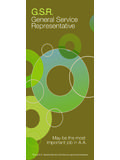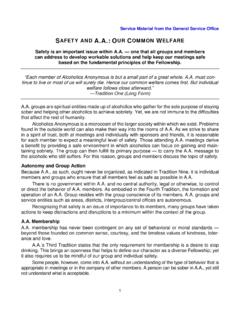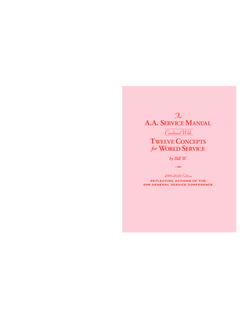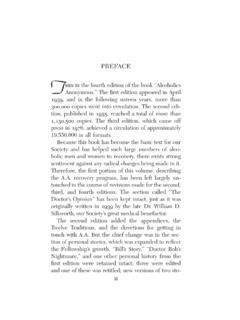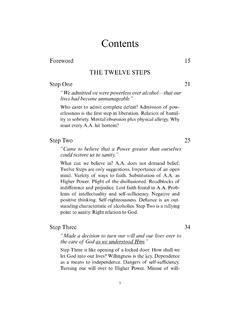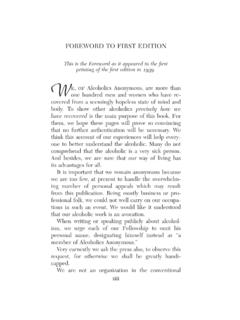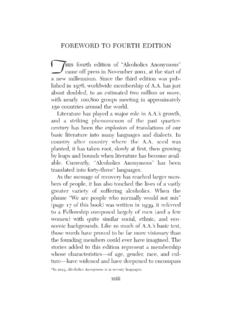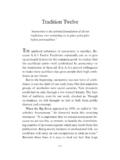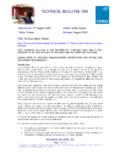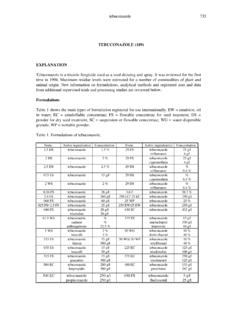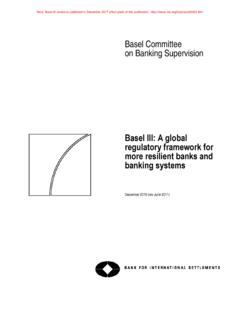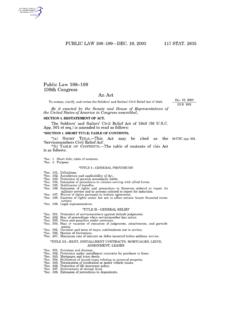Transcription of The Twelve Traditions - Alcoholics Anonymous
1 189 The Twelve Traditions (The Long Form)Our experience has taught us that:One Each member of Alcoholics Anonymous is but a small part of a great whole. must continue to live or most of us will surely die. Hence our common welfare comes fi rst. But individual welfare follows close For our group purpose there is but one ultimate au-thority a loving God as He may express Himself in our group Our membership ought to include all who suffer from alcoholism. Hence we may refuse none who wish to recover. Nor ought membership ever depend upon money or conformity. Any two or three Alcoholics gathered together for sobriety may call themselves an group, provided that, as a group, they have no other affi With respect to its own affairs, each group should be responsible to no other authority than its own conscience. But when its plans concern the welfare of neighboring groups also, those groups ought to be con-sulted.
2 And no group, regional committee, or individual should ever take any action that might greatly affect as a whole without conferring with the trustees of the General Service Board. On such issues our common wel-fare is paramount. Traditions LONG FORM190 Five Each Alcoholics Anonymous group ought to be a spiritual entity having but one primary purpose that of carrying its message to the alcoholic who still Problems of money, property, and authority may easily divert us from our primary spiritual aim. We think, therefore, that any considerable property of genuine use to should be separately incorporated and managed, thus dividing the material from the spiritual. An group, as such, should never go into business. Secondary aids to , such as clubs or hospitals which require much prop-erty or administration, ought to be incorporated and so set apart that, if necessary, they can be freely discarded by the groups.
3 Hence such facilities ought not to use the name. Their management should be the sole respon-sibility of those people who fi nancially support them. For clubs, managers are usually preferred. But hospitals, as well as other places of recuperation, ought to be well outside and medically supervised. While an group may cooperate with anyone, such cooperation ought never to go so far as affi liation or endorsement, actual or implied. An group can bind itself to no The groups themselves ought to be fully sup-ported by the voluntary contributions of their own mem-bers. We think that each group should soon achieve this ideal; that any public solicitation of funds using the name of Alcoholics Anonymous is highly dangerous, whether by groups, clubs, hospitals, or other outside agencies; that ac-ceptance of large gifts from any source, or of contributions carrying any obligation whatever, is unwise.
4 Then, too, we 191 Traditions LONG FORM view with much concern those treasuries which con-tinue, beyond prudent reserves, to accumulate funds for no stated purpose. Experience has often warned us that nothing can so surely destroy our spiritual heritage as fu-tile disputes over property, money, and Alcoholics Anonymous should remain forever non-professional. We defi ne professionalism as the occupation of counseling Alcoholics for fees or hire. But we may employ Alcoholics where they are going to perform those services for which we might otherwise have to engage nonalcohol-ics. Such special services may be well recompensed. But our usual Twelfth Step work is never to be paid Each group needs the least possible organiza-tion. Rotating leadership is the best. The small group may elect its secretary, the large group its rotating committee, and the groups of a large metropolitan area their central or intergroup committee, which often employs a full-time secretary.
5 The trustees of the General Service Board are, in effect, our General Service Committee. They are the custodians of our Tradition and the receivers of voluntary contributions by which we maintain our General Service Offi ce at New York. They are autho-rized by the groups to handle our overall public relations and they guarantee the integrity of our principal newspa-per, the Grapevine. All such representatives are to be guided in the spirit of service, for true leaders in are but trusted and experienced servants of the whole. They derive no real authority from their titles; they do not govern. Universal respect is the key to their LONG FORM192 Ten No group or member should ever, in such a way as to implicate , express any opinion on outside controversial issues particularly those of politics, alcohol reform, or sectarian religion.
6 The Alcoholics Anonymous groups oppose no one. Concerning such matters they can express no views Our relations with the general public should be characterized by personal anonymity. We think ought to avoid sensational advertising. Our names and pictures as members ought not be broadcast, fi lmed, or publicly printed. Our public relations should be guided by the prin-ciple of attraction rather than promotion. There is never need to praise ourselves. We feel it better to let our friends recommend And fi nally, we of Alcoholics Anonymous believe that the principle of anonymity has an immense spiritual signifi cance. It reminds us that we are to place principles before personalities; that we are actually to practice a gen-uine humility. This to the end that our great blessings may never spoil us; that we shall forever live in thankful con-templation of Him who presides over us all.
